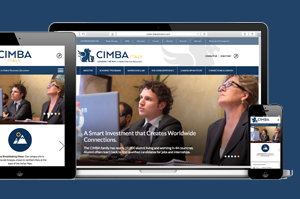Leadership Institute
Al’s Book Club
Welcome to Al’s Book Club (ABC). Written by CIMBA Italy’s Founder and President Dr. Al Ringleb, this monthly review series focuses on books with topics relating to CIMBA’s groundbreaking leadership initiatives and unique educational philosophy. White papers written by Dr. Al focus on topics relating to CIMBA’s groundbreaking leadership initiatives and unique educational philosophy.
|
June 2022 “Together, we can make a difference in so many important lives. ”by Al H. Ringleb |
Some of you may recall the CIMBA Origin Story. In brief, it began some 30+ years ago with my frustration at the unwillingness of the university at which I was a professor to even consider addressing what we now refer to as the “Character” problem. MBA students, while impressively well trained in the functional aspects of business – its fundamental axioms, theorems, formulas, and principles, were offered little, if any, training or guidance in critical reasoning, decision making, and behavior, and particularly those behaviors crucial to effective social interactions. In virtually all environments, whether at work or at play, those social interactions are vital to leading a quality life, encompassing such skills as building relationships, empathy, rapport, working with difficult people, difficult confrontations, change management, conflict management, negotiations, managing feedback, and sales, among several others. These skills, or better the lack thereof, are, in one form or another, at the fount of today’s inclusion and diversity issues as well. Deloitte forecasts that soft skill intensive occupations will account for two-thirds of all jobs by 2030, compared to less than half of all jobs in 2000. The number of jobs in soft-skill intensive occupations is expected to grow at 2.5 times the rate of jobs in other occupations, with particular emphasis on communication, teamwork, and problem solving, as well as emotional judgement, professional ethics, and global citizenship. Yet, few busines schools, and particularly in their MBA programs, have picked up on and addressed this important development shortcoming. In that specific regard, sadly, little has changed in those 30+ years.
So why am I sharing this with you? Over the past two weeks, I have had the great pleasure to observe our MBAs in action as they made their final consulting project presentations to their client companies. While the consulting project was an integral part of their CIMBA MBA experience, it was for me an opportunity for serious introspection. Is their CIMBA soft skill development, their Character development, making a measurable difference? Is the KT Decision Making and Problem-Solving training, LIFE, LIFE II Influence, coaching, assessments, the Alignment Quotient, and their acquired depth of understanding of neuroscience and its application to personal learning, growth, and development efforts paying off? Is there value in personal and professional development, and is the MBA, and particularly an MBA located physically outside their comfort zones, a productive vehicle for such learning and development?
My introspective conclusion was a resounding YES. I was so impressed, so moved, by their professionalism, dedication, presence, analysis structure, creativity, audience engagement … I can go on-and-on. Nine months have clearly made an impressive difference as reflected in the people they have become. The only way I can express my true emotions, my inner most thoughts and feeling, is to tell you that I felt like a proud father. A very proud parent.
There are several key people who made this happen. Francesca Basso worked diligently to recruit this impressive group of future leaders. Cristina Turchet built their remarkable KT toolbox, creating common language and common guidelines for the use of these indispensable skills both inside and outside the classroom walls. Siena Krusic and Angelo Balest maneuvered them though their LIFE Experience, where they discovered the power of vulnerability and psychological safety in becoming an impressive, supportive team prepared to take on the challenges of the year ahead. Sergio Cabigiosu led them through their Di Vinci Challenge bonding and development experience, uplifting their team skills and team spirit. Siena served as their personal development coach, guiding and supporting each of them individually in confronting the barrier that was keeping them from being the person they truly wanted to be. Chris Ancona shepherded them through a challenging and rewarding self-awareness experience by means of his Alignment Quotient, opening their minds to new perspectives about themselves and others. Angelo and Martina Franzini took them through the newest member of our very unique personal development program, LIFE II Influence, guided and assisted from afar by Rene Rodriguez, significantly enhancing their presentation skills and style, elevating their ability to influence to new levels. And Scott Newton took all of that and molded into a skill package like only Scott can do, and then guided them to manifest it in very interesting consulting projects from both the student and company perspectives. And me? I got to be a very proud parent.
But we can and must do even more! At the moment, only half of our MBA faculty is trained in KT, has experienced LIFE, and has explored personally the coaching function. LIFE II Influence is new and will be introduced to the faculty this summer. Can we even begin to imagine the depth of experience we would create for our students if all faculty were trained in these crucial to effectiveness critical reasoning, decision making, and behavioral tools and then brought them to the learning environment? If Deloitte, McKinsey, Accenture, PWC, and the other important management consulting firms are all so loudly proclaiming the importance of such development in our important young people, why are so few rising to the challenge? Why leave these important, fundamental skills to trial and error, and particularly in this technological era where actual physical social interaction is becoming less and less common but more and more an important ingredient for a productive, creative, and healthy life, perhaps the most important lesson learned from the pandemic? Let’s all accept the challenge and redouble our individual efforts to bring education out of the dark days of its medieval past and begin to prepare for the true future of work and the life satisfaction it carries with it. Let’s all feel the joy of being a very proud parent. Let’s all carry a torch for change. Together, we can make a difference in so many important lives, the lives of our students, the lives of our future colleagues, parents and leaders.



